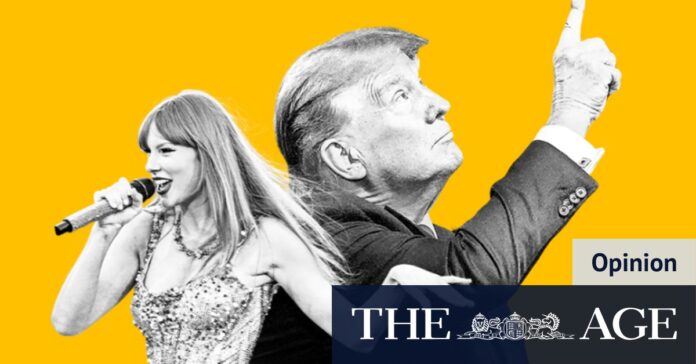[ad_1]
This week, as I’ve watched Australia become the latest territory to be annexed by the Taylor Swift empire, it occurred to me that something unusual was happening. Here were endless multitudes feeling extraordinary intimacy with a billionaire whose life has scarcely anything in common with their own.
That is not true of other pop stars, and certainly not of yesteryear’s rock stars. No one believes they are Mick Jagger or Beyonce’s friends. But to be among Taylor’s throng is to be surrounded by an overwhelming – and overwhelmingly positive – energy of female friendship.

Trading friendship bracelets has become a signature part of the Taylor Swift experience.Credit: Andrew Dyson
As young girls (and a few dads) rushed to shower me in friendship bracelets, or screamed each lyric in the face of a fellow Swiftie, it became clear that this was a decidedly horizontal experience: the vertical reality of society, where hierarchies of wealth, fame and power have such influence, disappeared. And all enabled by a shared, fanatical devotion to someone who, on any reckoning, sits at the apex of all those hierarchies.
That’s quite something in an age becoming increasingly inflected with envy. Billionaires were never popular, but they are almost reflexively reviled today in our time of rising inequality. Politicians profit from attacking them. Cultural artefacts such as Succession and White Lotus reflect our fascination with, but also disdain for the super-rich who we presume to be undeserving, exploitative, dysfunctional human beings rather than avatars of aspiration and achievement.
I got halfway to thinking Taylor Swift is a rare exception to this rule. Then I recalled two other crowds I’ve experienced in which ordinary people find themselves utterly in the thrall of hugely wealthy objects of devotion. The first is a Donald Trump rally. The second is almost any massive sporting event: you can choose whichever you wish, really, but for the purposes of highlighting the wealth disparity, think of something like the Super Bowl or the Premier League. In all cases, the alienation that usually attaches to inequality gives way to a soul-deep sense of identification. Love –even intoxication – eclipses envy.
Loading
These might seem odd words to use of a Trump rally, which appears more framed by animosity. But my biggest surprise when I attended one was that the feeling in the air wasn’t nearly as septic as I’d expected. Here, too, the energy was overwhelmingly positive, even as the rhetoric was negative. The people were warm, excited and cheerful, not grizzled and aggressive. One teenage girl, her face adorned with glitter and a beaming smile, spoke to me wearing a “Hillary for Prison 2016” T-shirt with an incongruous lightness. If you told me she was a Swiftie, I would’ve wholeheartedly believed you.
There’s no enemy at a Taylor Swift concert (perhaps aside from her ex-boyfriends and Scooter Braun) in the way there clearly is at a Trump rally. But the relationships are similarly horizontal: the solidarity these people have for one another is unmissable. As Swift becomes the conduit for mass female friendship, Trump becomes the conduit for a fraternity of outsiders. If Swift sings of her life in a way that feels like she’s singing about yours, Trump identifies himself with your invisibility, thereby making you visible. Both billionaires “get” you. And in Trump’s case, his billions only stand as evidence he knows the system, he knows the elites backwards, he understands their game, and is prepared to give all that up for your sake. “I went from being the ultimate insider to being an outsider” he would say, before making the pronoun inclusive: “We are doing so well. This is a movement like they’ve never, ever seen before.”
Meanwhile, team sport is all about the “we”. Players and fans alike will say it because all are on a tribal quest for glory. This makes the connections between fans and multi-millionaire star players thick and complex. They wear our shirt, they represent our city, they play the sport we played as a child and live our dream on our behalf, relying on our vocal support. The star player is therefore one of “us” in an almost visceral way, which is why the worst thing a player can do is give the impression of not trying, or not hurting when things go badly. We cease being divided by wealth and fame. We are joined by a common quest and – most importantly – the common peril of defeat.
[ad_2]
Source link


